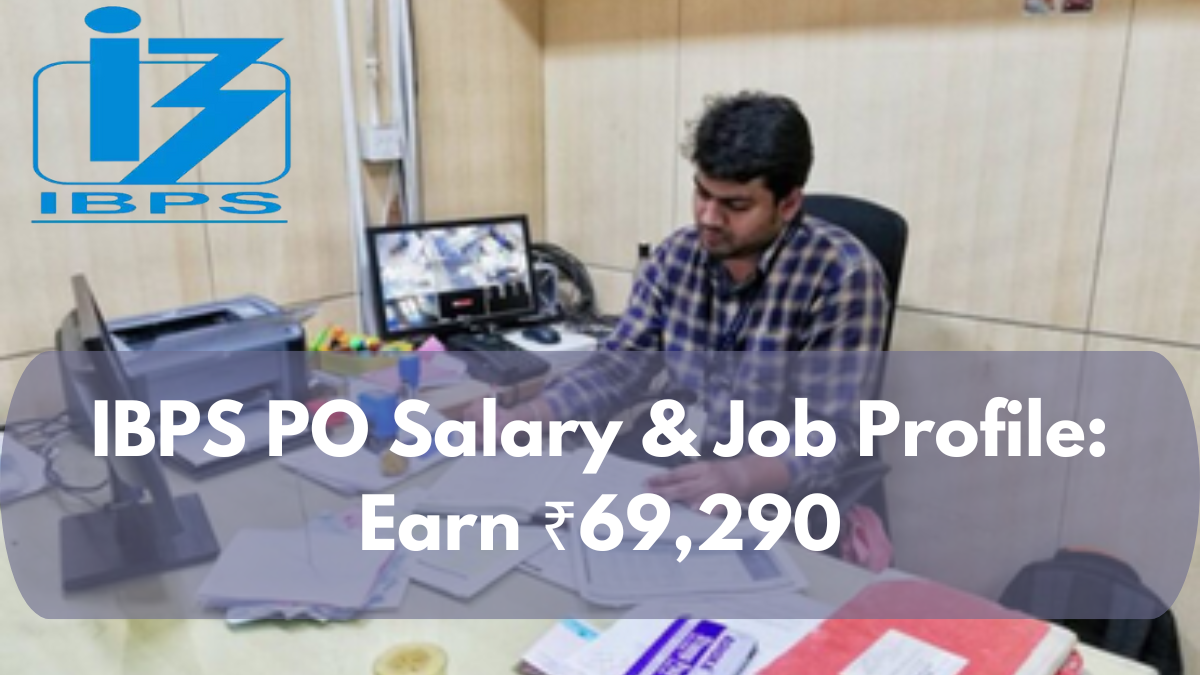The IBPS PO (Institute of Banking Personnel Selection Probationary Officer) is one of the most sought-after positions in the banking sector. It is highly regarded due to its competitive salary structure, financial perks, and career growth opportunities. Thousands of candidates appear for this prestigious exam annually, making it one of India’s most challenging recruitment processes.
While the salary is undoubtedly attractive, the position also has numerous allowances and benefits, ensuring a stable and rewarding career for successful candidates. This guide comprehensively overviews the IBPS PO salary structure, components, perks, and career progression.

IBPS PO Salary Structure
The 7th Pay Commission guidelines govern the IBPS PO salary and have been revised after the 12th Bipartite Settlement. The basic salary for an IBPS PO starts at ₹48,480 per month. With additional allowances and benefits, the gross monthly salary is approximately ₹83,125. After mandatory deductions, the in-hand salary is about ₹69,290 per month.
Here is a breakdown of the key components that make up the IBPS PO salary:
| Component | Details | Amount (Approx) |
|---|---|---|
| Basic Pay | Fixed salary starting at ₹48,480 | ₹48,480 |
| Dearness Allowance (DA) | 23.87% of the basic pay | ₹11,570 |
| House Rent Allowance (HRA) | 7% to 9% of the basic pay (location-based) | ₹3,600 – ₹4,300 |
| Special Allowance | 7.75% of the basic pay | ₹3,750 |
| City Compensatory Allowance (CCA) | 0% to 4% of basic pay based on location | ₹0 – ₹1,900 |
| Gross Salary | Total before deductions | ₹83,125 |
| Deductions | NPS, taxes, etc. | ₹13,835 |
| Net In-Hand Salary | Final salary received after deductions | ₹69,290 |
Key Components of IBPS PO Salary
1. Basic Pay
The basic pay forms the foundation of an IBPS PO’s salary. Recruits start with a basic pay of ₹36,000, which gradually increases over time through annual increments and promotions. After revisions, the current basic pay for IBPS PO stands at ₹48,480.
2. Dearness Allowance (DA)
DA is designed to mitigate the impact of inflation on the officer’s purchasing power. It is revised quarterly based on the Consumer Price Index (CPI). The DA is 23.87% of the basic pay, which increases proportionally with inflation.
3. House Rent Allowance (HRA)
HRA is provided to help officers meet their housing expenses. It varies based on the location of the posting:
- Metro Cities: 9% of the basic pay
- Urban Areas: 8% of the basic pay
- Rural Areas: 7% of the basic pay
For instance, officers in cities like Mumbai or Delhi receive higher HRA than those in rural postings.
4. Special Allowance
Special Allowance is fixed at 7.75% of the basic pay. It is a unique component added to the salary without being tied to any particular expense.
5. City Compensatory Allowance (CCA)
CCA is provided to offset the high cost of living in urban centres.
- Metro Cities: Up to 4% of basic pay
- Small Towns/Rural Areas: 0%
Additional Perks and Benefits for IBPS POs
In addition to a lucrative salary, IBPS PO officers enjoy a range of perks and benefits that add substantial value to the role.
- Accommodation: Officers receive official quarters or housing allowances to cover rental expenses depending on the posting.
- Travel Allowance: Fixed allowances are provided for travel-related expenses. Officers using personal vehicles are reimbursed for fuel costs.
- Medical Coverage: Annual medical allowances of up to ₹80,000 cover healthcare expenses, ensuring financial security for medical needs.
- Newspaper Allowance: A small monthly allowance is provided to cover newspaper subscriptions.
- National Pension Scheme (NPS): Officers are enrolled in NPS, ensuring a financially secure retirement.
- Miscellaneous Benefits: Additional perks like entertainment allowances and leave benefits further enhance the appeal of the IBPS PO role.
Job Responsibilities of an IBPS PO
IBPS PO officers undergo extensive training and are entrusted with diverse responsibilities, including:
- Customer Interaction: Resolving queries and providing excellent customer service.
- Branch Operations: Managing daily banking operations for a smooth workflow.
- Loan Processing: Reviewing and approving loan applications as per bank guidelines.
- Business Development: Attracting new customers and promoting bank products to boost revenue.
Career Growth and Promotion Opportunities
The IBPS PO position offers remarkable opportunities for career progression. Officers can advance through:
- Merit-Based Promotions: Exceptional performance can accelerate career growth.
- Seniority-Based Promotions: Experience and tenure also lead to higher designations.
Promotional Hierarchy for IBPS POs:
- Junior Manager (Scale I)
- Manager (Scale II)
- Senior Manager (Scale III)
- Chief Manager (Scale IV)
- Assistant General Manager (Scale V)
- General Manager
- Executive Director/Managing Director
Promotions are often accompanied by significant salary increments, motivating officers to excel.
Conclusion
The IBPS PO position offers an attractive salary, numerous benefits, and a clear path for career growth. It is an excellent choice for candidates seeking a stable, rewarding, and progressive career in the banking sector.
FAQs
1. What is the starting salary for an IBPS PO?
The starting basic pay for an IBPS PO is ₹48,480, with a gross salary of around ₹83,125 per month.
2. What allowances are included in the IBPS PO salary?
The IBPS PO salary includes DA, HRA, CCA, and Special Allowance.
3. How much does an IBPS PO take home after deductions?
After deductions for NPS, taxes, and other charges, the in-hand salary is approximately ₹69,290 per month.
4. Does an IBPS PO get housing benefits?
Yes, IBPS POs receive housing benefits through HRA or official accommodations.
5. What are the career growth opportunities for IBPS POs?
IBPS POs can progress to higher positions like Senior Manager, General Manager, and Executive Director through merit or seniority-based promotions.
Click Here To Know More

I am a passionate technology and business enthusiast. I constantly explore the intersection where innovation meets entrepreneurship. With a keen eye for emerging trends and a deep understanding of market dynamics, I provide insightful analysis and commentary on the latest advancements shaping the tech industry.
